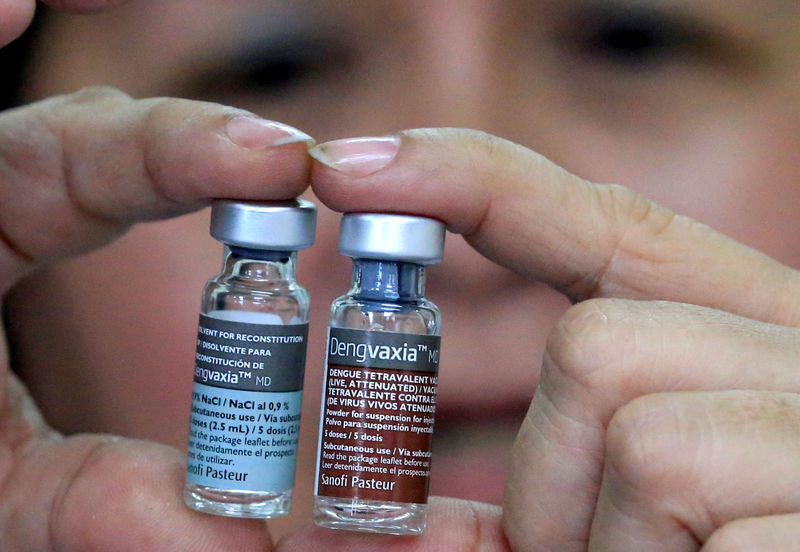By Matthias Blamont
PARIS (Reuters) - Sanofi (PA:SASY) still needs to convince markets it can deliver on an exciting and sustainable growth path as it contends with fresh difficulties in its vaccines arm and looks set for another gloomy year in diabetes, investors told Reuters.
The French drugmaker holds an "innovation day" on Wednesday to discuss its pipeline of new drugs while it attempts to overcome fallout from a safety row in the Philippines over its dengue vaccine.
Already irked by the lack of a large acquisition since Olivier Brandicourt was appointed as chief executive in 2015, some investors are losing patience that has been stretched for months.
Shares in Sanofi are trading close to a 10-month low and are down more than 4 percent this year after a 2.2 percent decline last year.
Over the past five years they have lagged the sector, rising about 3 percent against a 49 percent gain for the STOXX Europe 600 Healthcare index (SXDP).
"Nothing is happening in terms of business development and there is very little news in the pipeline. What just happened with dengue is negative and shocking," said Rudi Van Den Eynde, of asset management firm Candriam.
DENGVAXIA BLOW
The Philippines suspended a national immunization program last week after Sanofi's recent findings that its Dengvaxia vaccine could, in some cases, increase the risk of severe dengue in recipients not previously infected by the virus.
Manila launched an investigation and halted the sale of the medication.
Once touted out as a potential $1 billion-a-year blockbuster product, Dengvaxia's initial sales last year were only 55 million euros ($65 million) and industry analysts have been dialing back expectations.
The Dengvaxia blow follows two other snags at Sanofi Pasteur, the group's vaccines unit.
The division ended the development of an experimental vaccine for clostridium difficile infection this month and pulled out of a Zika vaccine program with the U.S. military this summer.
PRESSURE AHEAD
Last month Sanofi said that currency-adjusted sales at its diabetes franchise were likely to have shrunk by 6-8 percent a year between 2015 and 2018 after third-quarter results below expectations.
It had previously forecast a 4-8 percent drop owing to persistent pricing pressure in the United States, the world's largest healthcare market, where its blockbuster insulin drug Lantus has lost its patent.
"What is frustrating is that we constantly feel Sanofi is one step behind the competition," another London-based investor said, asking not to be named.
"We are not expecting anything magical during the innovation day. Management is likely to talk at length about its monoclonal antibody candidate in multiple myeloma, isatuximab, but Genmab (CO:GEN) and Johnson & Johnson (J&J) (N:JNJ) already have a drug on the market, Darzalex, that sells well."
NO CHEAP TARGETS
Sanofi has said several times this year that it has felt no urge to engage in a large acquisition and that investors were lauding its financial discipline.
The group has, however, failed to land major deals after losing California-based cancer specialist Medivation to Pfizer (N:PFE) in 2016 and Swiss biotech company Actelion to U.S. drugmaker J&J in January.
"Looking back, Sanofi would maybe have overpayed for Medivation. In that regard, their discipline is healthy, yet we see that the company is struggling at laying out a strategy and getting us excited," Moneta Asset Management's Gregoire Uettwiller said.
Moneta and Candriam are both long-term investors with small stakes in Sanofi of around 0.1 percent, Reuters data shows.
Candriam's Van Den Eynde, meanwhile, says Sanofi needs to shed its qualms about splashing out on a big deal.
"Once you see that your pipeline is not paying off, you cannot be naive, you must engage in M&A," Van Den Eynde said.

"Hiding behind the fact that targets are expensive is not doing it. In the modern world, no interesting firm will be available at low valuations."